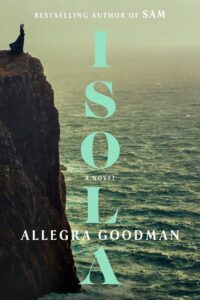Allegra Goodman on the (Almost) Life-Saving Power of Audiobooks

What’s worse than Middle School? Watching your child suffer through it. Those years were excruciating for my son Elijah—even at his small progressive school. Bright, reserved, and contrary, Elijah struggled with a student-centered curriculum designed for exuberant, expressive kids. He cringed at open-ended assignments, leaving his paper blank when teachers asked, “What are your hopes and dreams for the new year?” When pressed, he declared, “I have no hopes and dreams.” Defiance? Deep satire? Zen enlightenment? Who could say?
By seventh grade, Elijah balked at group projects and left class when he couldn’t take the noise. Increasingly overwhelmed, he stopped doing homework and began opting out of group projects. Some teachers were patient. Others fumed. His school was all about celebrating the individual, but struggled with the individual who did not feel like celebrating.
Eighth grade graduation involved a capstone project and oral presentation by each child in the class. With much coaxing on my part, Elijah wrote a series of short essays in which he paired each year of lower school with an element, a la Primo Levi’s Periodic Table—but he refused to present his work. The day of the capstone ceremony, Elijah refused to enter the room altogether. I argued, cajoled, begged him to come sit with me in the audience, but no. Shocked and indignant, another parent turned to me, demanding, “Doesn’t he want to see his classmates perform?”
“I think he’s heard them at rehearsal,” I answered, as I joined the audience alone.
For the next two hours, I listened to students speak about their projects. A container garden symbolizing how much one girl had grown. A duet of “For Good” from Wicked celebrating friendship. A radiant boy belted “My Corner of the Sky” the ballad from Pippin about not fitting in. And I thought how? How were Elijah and I going to get through high school?
I crave a capstone—but my son has never been one to emote about the past, and he does not indulge me now.
The question was practical as much as anything else. I’d found a school for bright kids with anxiety or autism or sensory issues, but it was an hour’s drive from our house. Elijah hated mornings. I hated driving, and we would need to leave by seven am at the latest.
Alone on a test drive, I assessed the situation. The trek was a reverse commute, but it took twenty minutes just to get out of Cambridge. Northbound on the highway, traffic was light, but I could see that the Boston-bound traffic was bumper to bumper. If I didn’t want to spend the school day in my car, I would need to rent an office near school to work until pickup at two-fifteen. I was fortunate that I could pay for this, but would Elijah submit to the commute? Would I have the stamina and patience?
Trucks crowded the highway and one cut me off. I turned on the radio to calm myself, and that was when it came to me—audio books. Listening to books had been Elijah’s greatest pleasure when he was little. On planes he had listened for hours to a recording of The Lion, the Witch, and the Wardrobe. In kindergarten his astute teacher had allowed him to listen to books when he found the classroom overwhelming. As the third of four children, he had grown up listening to a mix of music and children’s books which I played in the car to keep the peace.
“This is my plan,” I told Elijah that night. “We’ll alternate between novels and American history.”
“Okay,” Elijah said, doubtfully.
The first day of school, Elijah dragged himself out of bed. He sighed as I showed him the blank book I’d bought to log our progress through history and literature.
As I loaded my bags, the drive loomed large, not just because of trucks or traffic, but because I wanted so much for this to work—for Elijah to thrive at school.
I was jittery. Elijah was half-asleep. I was desperate for a new start. He hated change. But when I started the car and began our first audio book, someone new entered the conversation. Alexandre Dumas. Within minutes, we were transported to the world of The Three Musketeers. Duels and secrets and spies and stolen diamonds. Adventure and absurdity. Dumas carried us away. The humor in this book! We played one scene again and again, because it was so funny. I got distracted, missed my exit, and had to circle back, but we made it to school.
When I look back on those years, I remember I was always tired. High school had its challenges. Elijah did not magically transform into a happy-go-lucky teenager—but his school was a good fit. He went willingly and completed his assignments. And every day, twice a day, we listened to our books. In sun and wind, we listened to Pride and Prejudice and The Autobiography of Ben Franklin and Invisible Man. In heavy fog, we heard Beowulf. “Almost white out conditions” I wrote in my log. In snow we listened to The Iliad. I remember hearing David McCullough’s history of the Brooklyn Bridge in pounding rain. Stormy mornings when I listened hard to Moby Dick on icy roads. Bright afternoons when we laughed out loud at Don Quixote.
In a world of talkers, he is a gifted listener. In an onslaught of feeling, he chooses cheerful fact.
Elijah did not enjoy all my choices. He told me War and Peace was overrated, and my beloved Daniel Deronda bored him. But my son listened closely to every selection. He remembered plot points better than I did and assessed historical figures concisely. “Mean,” he said of Voltaire. “Creepy,” summed up Alexander Hamilton. “He was probably the first guy to sit in his basement stroking a cat.” He relished Sir Walter Scott, Charles Dickens, and the plays of George Bernard Shaw. Most surprising, my laconic teenager shared my love of Austen. Those hours listening to Pride and Prejudice were some of the happiest of my parenting life. I wrote in my log, “Elijah loves this book more than any other except maybe Kim and has memorized his favorite lines.”
The commute was rough but in many ways the time was perfect. Familiar books were new to me when I heard them with my son. I got to share his laughter and suspense. As for Elijah, he got out of talking about his day. Jumping into the car at pick up, he started our recorded book before I could ask, How are you? How did it go? How do you feel? Books are merciful this way. They fill your mind with other people’s questions and dilemmas, offering entertainment, adventure, and privacy. So it was that we spent hundreds of hours together and had a respite from each other too.
In John Cheever’s story, “The Swimmer” Neddy Merrill swims from one backyard pool to the next, traversing his suburban neighborhood from season to season. I remember our drives like that. Our blue car rolling from green summer through flaming autumn into white winter and patchy spring. We listened to the shifting tide of Homer’s verses, the wit of Thoreau’s Walden “actually pretty good,” in Elijah’s opinion, and the sweeping tragedy of Steinbeck’s Grapes of Wrath. “Could you find anything more depressing?” Northanger Abbey delighted Elijah. “She’s just like Don Quixote” he said of the romance-reader Catherine Moreland. Four years, five days a week, two hours a day. Thirty-seven works of history and biography. Thirty-two works of fiction, poetry, and drama. So many voices, so many characters and incidents sustained us.
Elijah is now a college graduate and an aspiring chemist. Our commute seems a long-ago adventure, and he is surprised when I ask, “What memories do you have of driving to school?”
“The puddle.”
“Puddle? What puddle?”
“You went around it but the car after us got stuck when they tried to drive through.”
“That’s what you remember?” It’s humbling what children recall! “What about the history and literature project?”
“Austen is great,” he says, immediately. “Tolstoy is overrated. Team of Rivals was really good. And Robert Caro. Master of the Senate!”
“But what did you think of the whole thing?”
He doesn’t say.
“What three words would you use to describe the drive?”
“Useful.” Elijah says slowly. “Meditative. Repetitive.”
Repetitive, I think. Yes. Meditative. True. The drive was like a recurring dream. Strange, exhausting, magical. The closest we had ever been. “How was the drive useful?”
Like Elijah’s middle school teachers, I crave a capstone—but my son has never been one to emote about the past, and he does not indulge me now. In a world of talkers, he is a gifted listener. In an onslaught of feeling, he chooses cheerful fact. “We got through a lot of books.”
__________________________________

Isola by Allegra Goodman is available from Dial Press, an imprint of Random House, a division of Penguin Random House, LLC.